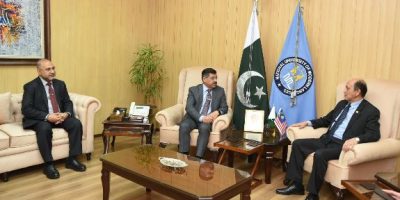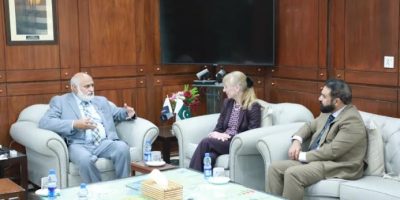𝟱𝘁𝗵 𝗩𝗶𝗰𝗲 𝗖𝗵𝗮𝗻𝗰𝗲𝗹𝗹𝗼𝗿𝘀’ 𝗙𝗼𝗿𝘂𝗺 𝗼𝗳 𝗜𝘀𝗹𝗮𝗺𝗶𝗰 𝗖𝗼𝘂𝗻𝘁𝗿𝗶𝗲𝘀 𝗜𝗻𝗮𝘂𝗴𝘂𝗿𝗮𝘁𝗲𝗱 𝗶𝗻 𝗜𝘀𝗹𝗮𝗺𝗮𝗯𝗮𝗱

Islamabad, Mar 19 /DNA/ – The 5th Vice-Chancellors’ Forum of Universities in the Islamic World on the theme “Towards Disruptive Technology in a Globalised World” was inaugurated in Islamabad on Sunday.
Over 250 Vice Chancellors, including 40 from 20 OIC countries are participating in the Forum, which is aimed at sharing experiences, pooling resources, fostering collaborations, strengthening networks between universities, and promoting dialogue on the future of higher education in the Islamic World.
The VC Forum 2023 is being jointly organized by the Higher Education Commission (HEC) Pakistan, Ministry of Federal Education and Professional Training, Islamabad, COMSATS University Islamabad (CUI), Islamic World Educational, and Scientific and Cultural Organization (ICESCO), and British Council Pakistan.
While speaking during the opening ceremony, Federal Minister for Education and Professional Training, Rana Tanveer Hussain, as chief guest, emphasised the need for skill development of youth and that the universities needed to respond more effectively to the rapidly developing realities. The Minister called upon all Islamic countries to pool resources and expertise to benefit the entire Muslim Ummah. He said the most important outcome of education is the development of a good moral character. He highlighted the need to develop a framework for mutual recognition of degrees among OIC member states, which can potentially facilitate greater movement of skilled manpower and increase collaborative research between Islamic countries.
In his video message, President of Pakistan Dr. Arif Alvi highlighted the huge potential of youth bulge of the country and called for setting vision for higher education. He said the Muslims could not keep pace with adoption of technology, which needs to change on war-footing. He added that in the last 10 years, sectors focusing on natural resources were overtaken by large technological conglomerates like Amazon and Google. These companies have attracted intellectual capital from the world and raised the need for greater access to quality online education particularly in developing countries.
Dr. Salim M. AlMalik, Director General, ICESCO, while referring to the Holy Quran said that Mankind has been given limited knowledge, yet this little knowledge has caused great disruption such that what is taught in universities is almost redundant by the time students graduate. He informed the audience that the development of robotics would make 97 million jobs obsolete in the next 10 years, 375 million people would have to switch their jobs, causing immense disruption and increasing the digital divide. Dr. AlMalik also emphasised the need to reconstruct the glorious Islamic heritage in science.
Dr. Mukhtar Ahmed, Chairman HEC urged the participants to contemplate how the Muslim Ummah can be steered into the right direction. He reminisced the immense contributions of early Muslims, that were fundamental to advances in science and technology being at the root of global development today. He gave an overview for establishing the platform of VC Forum and how it will help higher education institutions in the Islamic world to collaborate and contribute to socio-economic development. Dr. Ahmed called for devising tangible initiatives and support of the Governments for reshaping the higher education landscape in the Islamic world.
In his welcome note, Rector Comsats University Islamabad, Prof. Dr. Muhammad T. Afzal emphasised the importance of curriculum development and providing equal opportunities to students. He urged the Government to allocate at least 4% of the GDP to education only then would the country be able to reverse the current negative trend of brain drain. He lauded the Government’s initiatives for creating internship opportunities for the youth and called for making internships an integral part of the curriculum. He strongly recommended addressing the challenges of access, quality and relevance of teaching and research as well as financial sustainability of universities in the Muslim world.
Advisor to the President of Council of Higher Education, Turkiye, Mustafa Turker Ari informed the audience about the havoc caused by recent earthquakes in Turkiye that has affected 9% of the entire student population and how the country was responding by initially resorting to online education, which would gradually lead to hybrid mode. He said that his country laid great emphasis on Techno Parks in view of the strong global competition for creating entrepreneurial opportunities for the youth.
Maria Rehman, Country Director, British Council Pakistan talked about reforming the educational system, building partnerships for increasing access to quality learning, which is quite a challenge. She pointed out the disconnect between universities and industry and the need to bridge this gap.
A Memorandum of Understanding between the Higher Education Commission (HEC) and the World Business Angels Investment Forum (WBAF) was signed during the opening ceremony. This MoU is expected to enhance the capabilities of entrepreneurs and knowledge-based startups by matching them with global investors and providing them with global networking.
Related News

NUML hosts Malaysian envoy for academic talk
ISLAMABAD, FEB 20 /DNA/ – Ambassador Dato’ Mohammad Azhar Mazlan, High Commissioner of Malaysia toRead More

Germany a key partner in strengthening higher education linkages: Chairman HEC
ISLAMABAD, FEB 18 /DNA/ – The Chairman of the Higher Education Commission (HEC), Prof. Dr.Read More


Comments are Closed